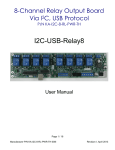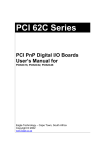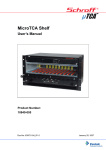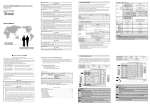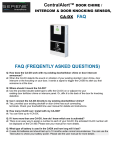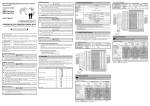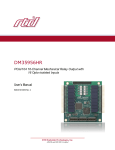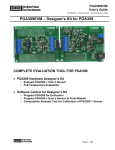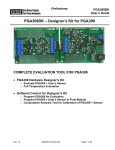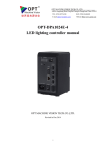Download Manual - LightSoSoft
Transcript
8-Channel Relay Output Board Via I2C Protocol P/N KA-I2C-8-RELAY I2C-Relay8 User Manual 8-Channel Relay Output Board Via I2C Protocol P/N KA-I2C-8-RELAY Table of Contents What Does it Do? ...................................................................................... 3 What Do I Need to Make it Work?............................................................. 3 What Else Does it Work With? .................................................................. 4 How to Use This Device ............................................................................ 5 Setting Up the Controller ........................................................................ 5 Powering Up the I2C-Relay8 .................................................................. 5 Connecting to the I2C Communications Port .......................................... 6 IDC connectors J3 and J2 ................................................................... 6 Terminal Blocks TB18-TB20 ................................................................ 6 Setting the I2C Address .......................................................................... 7 Using the I2C-Relay8 ............................................................................. 7 Illustrations ................................................................................................ 9 Technical Specifications.......................................................................... 14 Disclaimers.............................................................................................. 15 Manufacturer P/N KA-I2C-8-RELAY Page 2 / 15 Revision D, September 2011 8-Channel Relay Output Board Via I2C Protocol P/N KA-I2C-8-RELAY What Does it Do? The I2C-Relay8 is designed to generate digital output to up to 8 independent sources. It uses Power Relays to create this output. Each output port on the I2C-Relay8 has an LED indicator light which activates when the port is activated. The I2C-Relay8 is modular and expandable; in addition to being stackable, it can be assigned 1 of up to 8 unique addresses and monitored via the on-board I2C communications port. What Do I Need to Make it Work? You will need: • Controller module o USB-I2C-Relay10 o USB-I2C-RS232-Micro o WEB-I2C-Remote o Your own custom I2C controller module • Power Supply o 7.5VDC @ 100mA maximum o Can be brought in via on-board terminal block TB17 o Can be brought in via I2C port • 10-pin IDC connector, preferably in the form of a female-female ribbon cable Manufacturer P/N KA-I2C-8-RELAY Page 3 / 15 Revision D, September 2011 8-Channel Relay Output Board Via I2C Protocol P/N KA-I2C-8-RELAY • 14-22 AWG wire, for connecting ports to output sources, supplying power and I2C communications port What Else Does it Work With? The I2C-Relay8, in addition to interfacing with your own custom applications, can be used with a PC running LabView version 7 or later and a USB-I2C-Relay10 control module (see Figure 1). Simply connect your PC to the control module via USB, connect your I2C-Relay8 module to the controller via the I2C module, and from there use our LabView drivers to observe the state of all 8 input ports in real-time on up to 2 I2C-Relay8 modules. The I2C-Relay8 module can also be used with: • I2C-Opto8 • USB-I2C-RS232-Micro (stand-alone unit programmed via PC) • WEB-I2C-Remote (stand-alone server which executes commands via Ethernet connection) You can also have I2C-Relay8 modules working side-by-side with I2C-Opto8 input modules on the same controller. Manufacturer P/N KA-I2C-8-RELAY Page 4 / 15 Revision D, September 2011 8-Channel Relay Output Board Via I2C Protocol P/N KA-I2C-8-RELAY How to Use This Device Setting Up the Controller Perhaps your preference is for stand-alone operation, or remote accessibility, or a setup which doesn’t rely on an Ethernet connection. Whichever controller you choose, there are distinct advantages to each model. While operation of your controller can be as simple as plugging your controller into your power source and then connecting the I2C-Relay8 to your controller, we strongly encourage you to refer to the setup directions in the documentation for your controller. Powering Up the I2C-Relay8 Once your controller is properly powered up and configured, it’s time to set up your I2C-Relay8. First you have to decide how you are going to power the module – through the external power, or through the I2C port. It is recommended that if you are going to connect more than two modules to the controller, you should bring power in through the terminal block TB17. Once you have decided how to power your I2C-Relay8, there is a jumper, JP7 that needs to be configured, as illustrated in Figure 4. You need to make sure that it is in the correct position so that the appropriate power source is used, otherwise the unit will not function. Manufacturer P/N KA-I2C-8-RELAY Page 5 / 15 Revision D, September 2011 8-Channel Relay Output Board Via I2C Protocol P/N KA-I2C-8-RELAY If the shunt is over the right-hand pin (marked “INT”), power must either come from the terminal block TB17. If the shunt is over the left-hand pin (marked “EXT”), power must come from the I2C port. Connecting to the I2C Communications Port Connecting to the I2C communications port on your I2C-Relay8 can be done in one of two ways: IDC connector J2 This connector is also known as a 10-pin IDC connector. Generally what you plug into these are female-female ribbon cables which look like the illustration found in Figure 2. The pinout for these connectors is illustrated in Figure 3. Terminal Blocks TB18-TB20 First, you will need to short the pins of JP1 together. The specific pins you need for I2C communications are: • • • • TB19, “DI” TB20, “SK” TB18, “GND” TB19, “5V” Manufacturer P/N KA-I2C-8-RELAY Page 6 / 15 Revision D, September 2011 8-Channel Relay Output Board Via I2C Protocol P/N KA-I2C-8-RELAY The location of JP1 and the above pins are shown in Figure 5. Once you find them, use 22-14AWG wire to their sister pins on the controller and then “daisy-chain” them (connecting one to the next to the next) to any other modules the controller should be talking to. Setting the I2C Address Each unit operating on the same I2C communications bus must have a unique address. Since the I2C address space consists of 3 bits, that means that up to 8 unique devices can share the same I2C communications bus. On the I2C-Relay8, the I2C address is configured with three jumpers (1 for each bit of the address). Figure 6 shows you where to find these jumpers. To set the first bit of the address to “1”, short the “1” and “ADR” pins of JP3 together. To set the first bit to “0”, short the “0” and “ADR” pins of JP3 together. Repeat with JP4 and JP5 to set the second and third bits of the address. Using the I2C-Relay8 Once your I2C-Relay8 is connected to your controller and the unit’s address is configured, how exactly you actually use the product will rely heavily on the controller interface. If you are not using one of our controller units, your controller must write 2 bytes of information onto the I2C bus each time you wish to change the state of 1 or more channels – a byte for the address of the board you want to talk to, and a byte that represents which relays should be engaged and which relays should be disengaged. Manufacturer P/N KA-I2C-8-RELAY Page 7 / 15 Revision D, September 2011 8-Channel Relay Output Board Via I2C Protocol P/N KA-I2C-8-RELAY Bit 7 0 Bit 6 1 Bit 5 1 Address Byte Bit 4 Bit 3 Bit 2 1 X X A2 A1 (JP5) (JP4) Bit 1 X A0 (JP3) Bit 0 0 R/W Bit 1 X RL2 Bit 0 X RL1 Status Byte Bit 7 X RL8 Bit 6 X RL7 Bit 5 X RL6 Bit 4 X RL5 Bit 3 X RL4 Bit 2 X RL3 So, writing “011100010” for the address byte and “00001111” for the status byte means that the unit at address 1 will turn relays RL1-4 on and relays RL5-RL8 off. Please refer to the PCF8574a datasheet for more detailed information. Manufacturer P/N KA-I2C-8-RELAY Page 8 / 15 Revision D, September 2011 8-Channel Relay Output Board Via I2C Protocol P/N KA-I2C-8-RELAY Illustrations Figure 1: Screen view of LabView interacting with the I2C-Relay8. Manufacturer P/N KA-I2C-8-RELAY Page 9 / 15 Revision D, September 2011 8-Channel Relay Output Board Via I2C Protocol P/N KA-I2C-8-RELAY Figure 2: IDC Female-Female Ribbon Cable Manufacturer P/N KA-I2C-8-RELAY Figure 3: IDC Connector Pinout Page 10 / 15 Revision D, September 2011 8-Channel Relay Output Board Via I2C Protocol P/N KA-I2C-8-RELAY Figure 4: Power Jumper JP7. “INT” means power from the I2C port, “EXT” means power from the DIN connector J1 or terminal block TB17. Manufacturer P/N KA-I2C-8-RELAY Page 11 / 15 Revision D, September 2011 8-Channel Relay Output Board Via I2C Protocol P/N KA-I2C-8-RELAY Figure 5: I2C Jumper JP1, and the terminal block pins needed for I2C communications. Manufacturer P/N KA-I2C-8-RELAY Page 12 / 15 Revision D, September 2011 8-Channel Relay Output Board Via I2C Protocol P/N KA-I2C-8-RELAY Figure 6: I2C Address Jumpers JP3-JP5. Manufacturer P/N KA-I2C-8-RELAY Page 13 / 15 Revision D, September 2011 8-Channel Relay Output Board Via I2C Protocol P/N KA-I2C-8-RELAY Technical Specifications Number of Output Ports Arrangement Contact Materials Input Port Voltage Maximum Switching Max. allowable Voltage Max allowable current Operating humidity Ambient Temperature Unit Weight Form Factor 8 Form C, SPDT Optically isolated 5VDC, 5mA minimum 100 Hz 12VDC 12mA 10-80% RH non-condensing 0 to 60 C (with no icing) About 120 grams (4.3oz) 64 mm W x 252 mm L (2.5" X 9.9") Total Power Consumption 7.5VDC @ 100mA max. Short-Circuit Protection 1.5A with resettable PTC fuse Power Indicator Green LED Manufacturer P/N KA-I2C-8-RELAY Page 14 / 15 Revision D, September 2011 8-Channel Relay Output Board Via I2C Protocol P/N KA-I2C-8-RELAY Disclaimers THIS PRODUCT IS PROVIDED "AS-IS," "AS AVAILABLE," AND ALL WARRANTIES, EXPRESS OR IMPLIED, ARE DISCLAIMED (INCLUDING BUT NOT LIMITED TO THE DISCLAIMER OF ANY IMPLIED WARRANTIES OF MERCHANTABILITY AND FITNESS FOR A PARTICULAR PURPOSE). THE SOLE AND ENTIRE MAXIMUM LIABILITY OF CADX SERVICES, INC., FOR ANY REASON, AND BUYER'S SOLE AND EXCLUSIVE REMEDY FOR ANY CAUSE WHATSOEVER, SHALL BE LIMITED TO THE AMOUNT PAID BY THE CUSTOMER FOR THE PARTICULAR ITEMS PURCHASED. CADX SERVICES, INC. AND ANY OF ITS AFFILIATES, DEALERS OR SUPPLIERS ARE NOT LIABLE FOR ANY INDIRECT, SPECIAL, INCIDENTAL, OR CONSEQUENTIAL DAMAGES (INCLUDING DAMAGES FOR LOSS OF BUSINESS, LOSS OF PROFITS, LITIGATION, OR THE LIKE), WHETHER BASED ON BREACH OF CONTRACT, BREACH OF WARRANTY, TORT (INCLUDING NEGLIGENCE), PRODUCT LIABILITY OR OTHERWISE, EVEN IF ADVISED OF THE POSSIBILITY OF SUCH DAMAGES. THE LIMITATIONS OF DAMAGES SET FORTH ABOVE ARE FUNDAMENTAL ELEMENTS OF THE BASIS OF THE BARGAIN BETWEEN CADX SERVICES, INC. AND BUYER. THIS PRODUCT WOULD NOT BE PROVIDED WITHOUT SUCH LIMITATIONS. SOME STATE STATUTES MAY APPLY REGARDING LIMITATION OF LIABILITY. Manufacturer P/N KA-I2C-8-RELAY Page 15 / 15 Revision D, September 2011















